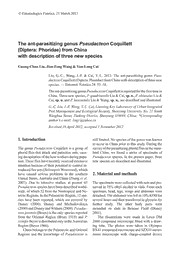
The ant-parasitizing genus Pseudacteon Coquillett (Diptera: Phoridae) from China with description of three new species PDF
Preview The ant-parasitizing genus Pseudacteon Coquillett (Diptera: Phoridae) from China with description of three new species
©EntomologicaFennica.21March2013 The ant-parasitizing genus Pseudacteon Coquillett (Diptera: Phoridae) from China with description of three new species Guang-ChunLiu,Jian-FengWang&Yun-LongCai Liu, G.-C., Wang, J.-F. & Cai, Y.-L. 2013: The ant-parasitizing genus Pseu- dacteonCoquillett(Diptera:Phoridae)fromChinawithdescriptionofthreenew species.—Entomol.Fennica24:53–58. Theant-parasitizinggenusPseudacteonCoquillettisreportedforthefirsttimein China.Threenewspecies,P.quadrisetalisLiu&Cai,sp.n.,P.obtusatusLiu& Cai,sp.n.andP.hexosetalisLiu&Wang,sp.n.,aredescribedandillustrated. G.-C.Liu,J.-F.Wang,Y.-L.Cai,LiaoningKeyLaboratoryofUrbanIntegrated PestManagementandEcologicalSecurity,ShenyangUniversity,No.21South Wanghua Street, Dadong District, Shenyang 110044, China; *Corresponding author’se-mail:[email protected] Received16April2012,accepted1November2012 1.Introduction stilllimited.Nospeciesofthegenuswasknown tooccurinChinapriortothisstudy.Duringthe ThegenusPseudacteonCoquillettisagroupof surveyoftheparasitizingphoridfliesinthemain- phoridfliesthatattackandparasitizeants,caus- land China, we found a series of specimens of ingdecapitationofthehostworkersduringpupa- Pseudacteonspecies.Inthepresentpaper,three tion.Theseflieshaverecentlyreceivedextensive newspeciesaredescribedandillustrated. attentionbecauseoftheirpotentialtocontrolin- troducedfireants(SolenopsisWestwood),which have caused serious problems in the southern 2.Materialandmethods UnitedStates,AustraliaandChina(Zhangetal. 2007). Due to intensive studies, at present 65 Thespecimenswerecollectedwithnetsandpre- Pseudacteonspecieshavebeendescribedworld- servedin75%ethylalcoholinvials.Fromeach wide,ofwhich52fromtheNeotropicalandNe- specimen, head, legs, wings and abdomen were arcticRegions.InthePalaearcticRegion,12spe- detached.Theabdomenwasleftin10%KOHfor cies have been reported, which are covered by severalhoursandthentransferredinglycerinfor Disney (2000), Disney and Michailovskaya further study. The other body parts were (2000)andDisneyandWithers(2009).Pseudac- mounded on slide in Belease Fluid (Disney teonjavensis(Brues)istheonlyspeciesreported 2001). from the Oriental Region (Brues 1915) and P. The illustrations were made in Leica DM criniferBeyerisdistributedonlyintheAustralian 2000compoundmicroscopefittedwithadraw- Region(Beyer1966). ing tube. The photos were taken in Olympus ChinabelongstothePalaearcticandOriental BX41compoundmicroscopeandSZX10stereo- Regions and the knowledge of Pseudacteon is zoom microscope with charge-coupled device 54 Liuetal. (cid:127) ENTOMOL.FENNICAVol.24 Fig.1.PseudacteonquadrisetalisLiu&Cai,sp.n.–a.frons.–b.palpus.–c.wing.–d.tergiteVI.–e.sternite VI.–f.dorsalplates.–g.partofventralplate.Scale:0.1mm. (CCD)imagingsystem.Theterminologymainly Paratypes:1$,samedataasholotype;2$$,Qiu followsDisney(2000).Measurementsaregiven Jia Ba (32.92°N, 104.32°E; 2,270 m), Wen inmillimeters. County,Gansu,7.VIII.2011,CaiYun-Longleg. ThetypespecimensaredepositedinLiaoning Description. Female. Head. Frons blackish Key Laboratory of Urban Integrated Pest Man- brown,withabout20hairsplus2onocellartrian- agementandEcologicalSecurity,ShenyangUni- gleandverydensefinemicrosetae.Fronswith2 versity,Shenyang,China. pairs of supra-antennal bristles, lower pair proclinate and the upper one reclinate. Upper pairsareashighastheanterolateralbristles(Fig. 3.Descriptionsofnewspecies 1a).Flagellomere1pear-shapedandaristalight brown. Palpus pale, very lightly tinged brown, 3.1.PseudacteonquadrisetalisLiu&Cai, and not enlarged, with 4 bristles at apical half sp.n.(Fig.1) (Fig.1b). Thorax. Brown with a bare mesopleuron. Typematerial.Holotype$:China:GuanEGou Eachsideofscutumwithasmallhumericalbris- (33.92°N, 104.29°E; 2,478 m), Tanchang tle,twonotopleurals,apre-alar,apost-alaranda County,Gansu.10.VIII.2011,CaiYun-Longleg. pre-scutellardorsocentralbristle.Scutellumwith ENTOMOL.FENNICAVol.24 (cid:127) ThreenewspeciesofPseudacteon(Phoridae) 55 Fig.2.PseudacteonobtusatusLiu&Cai,sp.n.–a.frons.–b.palpus.–c.wing.–d.tergiteVI.–e.sterniteVI. –f.ovipersitorsheathinlaterialview.–g.dorsalplate.Scale:0.1mm. an anterior pair of shorter bristles and a longer ratio 1.96:1. Costal cilia 0.08 mm (Fig. 1c). posteriorpair.Legsyellowishbrown.Fronttibia Halterebrown. withoutpalisade.Midtibiawithnear-dorsallon- Abdomen.Tergitesbrownwithminutesparse gitudinalhairpalisadeextendingabouttwothirds hairs only. Tergites II–V all very much broader oflengthandcomprising35–40modifiedhairs. thanlong,butprogressivelynarrowingfromter- Hindfemurwith6–8longhairsbelowbasalhalf giteIIbackwards.TergiteVIvariablewithsome and 6–8 long anteroventral hairs in outer half. bristles(Fig.1d).Ventergreyishbrownandseg- Hind tibia with 8–10 differentiated postero- ments 1–5 bare. Sternite VI blackish brown, dorsals before the stronger pre-apical bristles. clearly defined, with 4 very strong, pin-shaped The palisade of hind tibia completed, sinuous. bristlesandsomelong,bristle-likehairs(Fig.1e). Winglength1.68mm.Costalindex0.39.Costal Ovipositor sheath brown, downward. Dorsal 56 Liuetal. (cid:127) ENTOMOL.FENNICAVol.24 platearched,with3–4shorthairsonsub-apexof anteroventralhairsinouterhalf.Hindtibiawith8 eachside(Fig.1f).Ventralplatewith12–16fine, differentiatedposterodorsalsbeforestrongerpre- long and transverse-inclined hairs arranged in apicalbristles.Winglength1.36mm.Costalin- twolongitudinalrows(Fig.1g). dex 0.38. Costal ratio 1.87:1. Costal cilia 0.06 Male.Unknown. mm(Fig.2c).Halterebrown. Etymology.Thenamereferstothecharacters Abdomen.Tergitesbrownwithminutesparse ofabdominalsterniteVI. hairs only. Tergites II–V all very much broader Remarks. The new species is easily recog- thanlong,butprogressivelynarrowingfromter- nizedinhaving4verystrongpin-shapedbristles giteIIbackwards.TergiteVIreducedtoanarrow onabdominalsterniteVIandtransverse-inclined anteriorstripinmiddlebuteachlateralsidebear- longhairsonventralplateofovipositorsheath.In ing 2 bristle-like hairs at rear margin (Fig. 2d). the key to European Pseudacteon (Disney & Venter greyish brown and segments 1–5 bare. Withers 2009), the species runs to couplet 6, to Sternite VI brown, reduced to a narrow strip in P.fennicusSchmitz.Itdiffersfromthelatterby4 middle,bearing2shortbristlesand2–3hairson verystrong,pin-shapedbristlesonsterniteVIand eachill-definedside(Fig.2e).Ovipositorsheath 12–16fine,longandtransverse-inclinedhairson brown,downward(Fig.2f).Dorsalplatewithob- ventral plate of ovipositor sheath. In the key to tuseprocessonbaseandwithabout10hairson PseudacteonoftheRussianFarEast(Disney& subapex(Fig.2g).Ventralplatebare. Michailovskaya 2000), the species runs to cou- Male.Unknown. plet 4, to the putative female of P. pullum Etymology. The species name refers to the Michailovskaya,butitisdifferentinhaving35– charactersoftheovipositorsheath. 40modifiedhairsofmidtibialhairpalisade. Remarks.InthekeytoEuropeanPseudacteon (Disney2009),thespeciesrunstocouplet6,toP. fennicusSchmitz.Itdiffersfromthelatterinhav- 3.2.PseudacteonobtusatusLiu&Cai,sp.n. inganobtuseprocessondorsalplateofovipositor (Fig.2) sheath.InthekeytoPseudacteonoftheRussian Far East (Disney & Michailovskaya 2000), the Type material. Holotype $: China: Qiu Jia Ba speciesrunstocouplet4,totheputativefemaleof (32.92°N, 104.32°E; 2,270 m), Wen County, P. pullum Michailovskaya, but it is different in Gansu, 7.VIII.2011, Cai Yun-Long leg. Paraty- having 18–20 modified hairs of mid tibial hair pes:3$$,samedataasholotype. palisade. Description. Female. Head. Fronsyellowish brown,with20hairsplus2onocellartriangleand 3.3.PseudacteonhexasetalisLiu&Wang, verydensefinemicrosetae.Fronswith2pairsof sp.n.(Fig.3) supra-bristles, lower pair proclinate and upper onereclinate;upperpairhigherthananterolateral Typematerial.Holotype$:China:Mt.Daming bristles(Fig.2a).Flagellomere1pear-shapedand (23.28°N, 108.26°E;800m), Guangxi, 10.VIII. arista light brown, with 4 bristles at apical half. 2011,FengDian-XingandWangJian-Fengleg. Palpus pale, very lightly tinged brown, and not Description. Female. Head. Fronsyellowish enlarged(Fig.2b). brown,with20hairsplus2onocellartriangleand Thorax. Brown with a bare mesopleuron. verydensefinemicrosetae.Fronswith3pairsof Eachsideofscutumwithasmallhumericalbris- supra-antennal bristles, lower pair is preclinate, tle,twonotopleurals,apre-alar,apost-alaranda middle and upper ones reclinate; upper pair pre-scutellardorsocentralbristle.Scutellumwith higherthananterolateralbristles(Fig.3a).Flagel- an anterior pair of shorter bristles and a longer lomere1pear-shapedandaristalightbrown.Pal- posterior pair. Legs yellow. Front tibia without puspale,verylightlytingedbrown,andnoten- palisade.Midtibiawithnear-dorsallongitudinal larged(Fig.3b). hairpalisadeextendingabouttwothirdsoflength Thorax. Brown, with a bare mesopleuron. and comprising 18–20 modified hairs. Hind fe- Eachsideofscutumwithasmallhumericalbris- murwith6longhairsbelowbasalhalfand4long tle,twonotopleurals,apre-alar,apost-alaranda ENTOMOL.FENNICAVol.24 (cid:127) ThreenewspeciesofPseudacteon(Phoridae) 57 Fig.3.PseudacteonhexasetalisLiu&Wang,sp.n.–a.frons.–b.palpus.–c.wing.–d.tergiteVI.–e.sternite VI.–f.dorsalplate.–g.ventralplate.Scale:0.1mm. pre-scutellardorsocentralbristle.Scutellumwith thanlong,butprogressivelynarrowingfromter- an anterior pair of shorter bristles and a longer giteIIbackwards.TergiteVIwith3–4shortbris- posterior pair. Legs yellow. Front tibia without tlesoneachside(Fig.3d).Ventergreyishbrown palisade.Midtibiawithnear-dorsallongitudinal and segments 1–5 bare. Sternite VI blackish hairpalisadeextendingabouttwothirdsoflength brown, with some weak bristles and hairs (Fig. and comprising 19 modified hairs. Hind femur 3e). Ovipositor sheath fine, yellowish brown. with 6 long hairs below basal half and 4 long Dorsalplatewith5shorthairsonsub-apex(Fig. anteroventralhairsinouterhalf.Hindtibiawith8 3f).Ventralplatepointed,arrow-shaped,middle differentiatedposterodorsalsbeforethestronger partdark(Fig.3g). pre-apicalbristles.Winglength1.02mm.Costal Male.Unknown. index0.36.Costalratio1.44:1.Costalcilia0.05 Etymology. The species name refers to the mm(Fig.3c).Halterebrown. chaetotaxyoffrons. Abdomen.Tergitesbrownwithminutesparse Remarks. The new species is easily distin- hairs only. Tergites II–V all very much broader guishedfromotherspeciesbythreepairsofsu- 58 Liuetal. (cid:127) ENTOMOL.FENNICAVol.24 pra-antennal bristles and the characters of ovi- Disney,R.H.L.2000:RevisionofEuropeanPseudacteon positorsheath. Coquillett(Diptera,Phoridae).—Bonnerzoologische Beitraege49:79–91. Disney,R.H.L.2001:ThepreservationofsmallDiptera. Acknowledgements. The research was supported by the —Entomologist’sMonthlyMagazine137:155–159. National Natural Science foundation of China (No. Disney,R.H.L.&Michailovskaya,M.V.2000:Newspe- 31071965). cies of Pseudacteon Coquillett (Diptera: Phoridae) fromtheFarEastofRussia.—FragmentaFaunistica 43:35–45. References Disney, R. H. L. &Withers, P. 2009:Anew speciesof PseudacteonCoquillett(Diptera,Phoridae)andanew keytotheEuropeanspecies.—FragmentaFaunistica Beyer,E.M.1966:NeueundwenigbekanntePhoridae, 52:1–12. zumeistausdemBishopMuseum,Honolulu.—Paci- ZhangR.Z.,Li,Y.C.,Liu,N.&Porter,S.D.2007:An ficInsects8(1):165–217. overviewoftheredimportedfireant(Hymenoptera: Brues,C.T.1915:SomenewPhoridaefromJava.—New Formicidae)inmainlandChina.—FloridaEntomolo- YorkEntomologicalSociety23(3):184–193. gist90(4):723–731.
